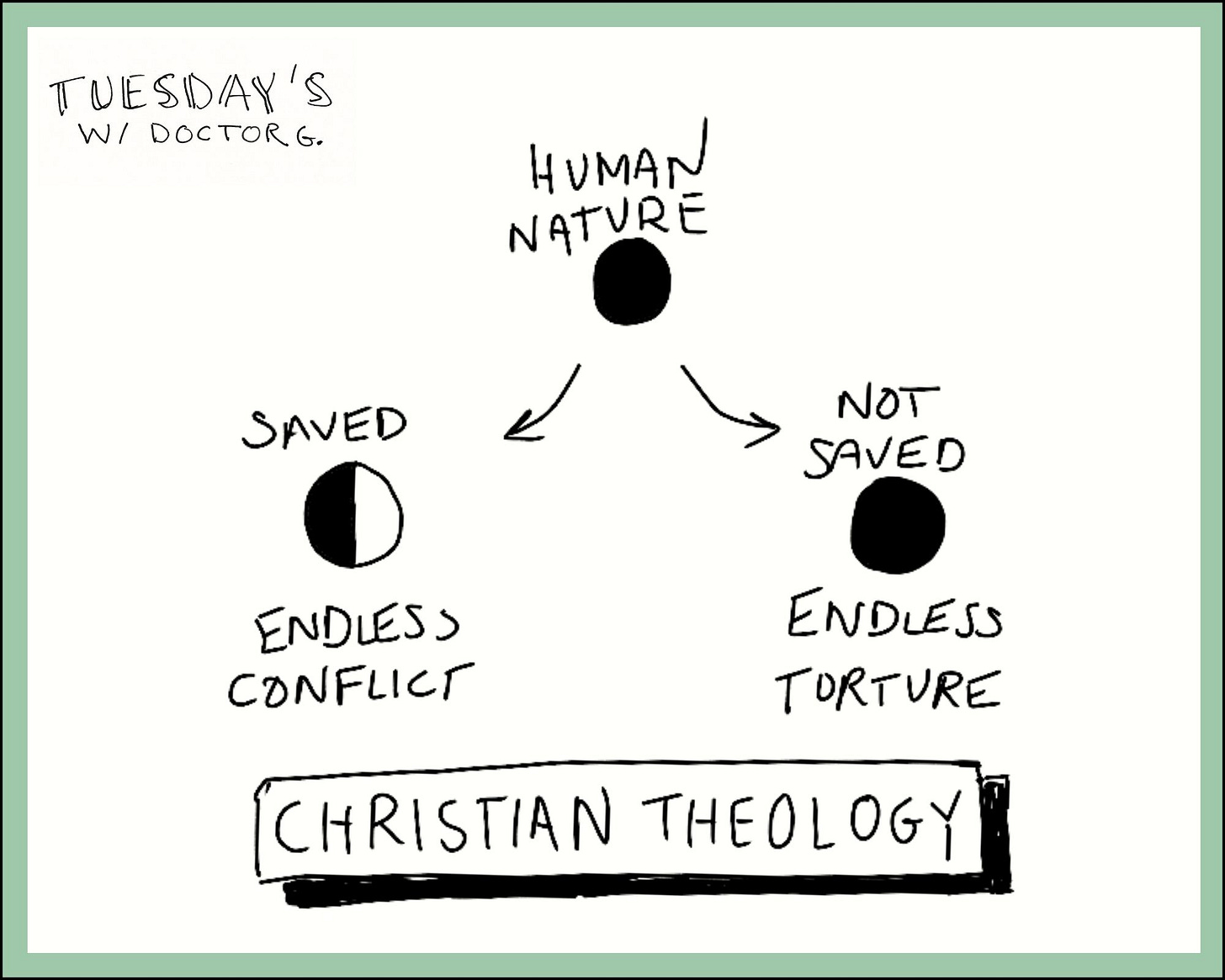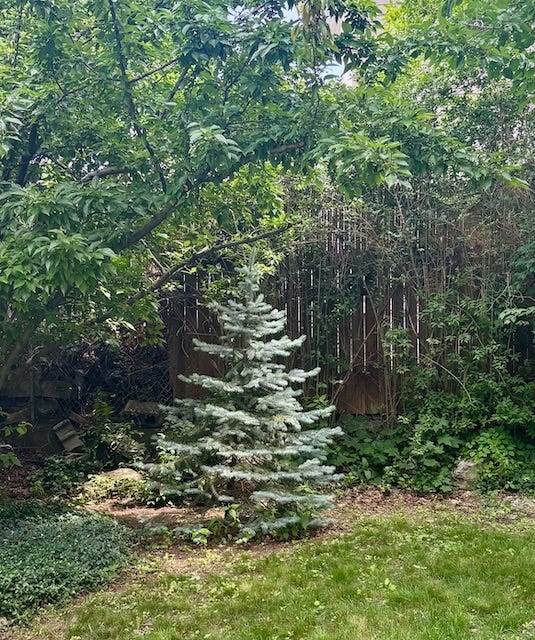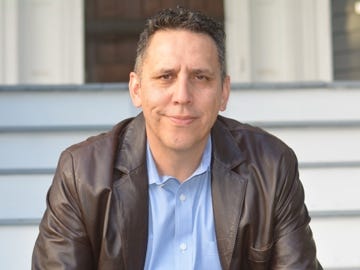The Gospel According to Lost: Two Views on Human Nature
The first, and most important integration, is to the self
Welcome to Tuesdays with Doctor G. where I am continuing a series entitled, “Pivot to a Soulcial Revolution: A Reconstruction Story in Two Parts.”
In the first post, I covered the transition from losing my faith to gaining an extraordinary gift on the other side—integration. I then provided an outline of the series where I would extend the concept of integration into five domains: self, spirituality, people, the planet, and the universe—the spokes of a Soulcial Revolution.
First up is the integration of the self via the story of two brothers in the Lost series.
Introduction
The entire storyline of Lost is an answer to this question:
What is human nature like?
It’s an important inquiry since it touches on everything from personal identity, to your relationships to self and others, and even how you view and treat your fellow human beings.
In the show, two brothers make a Job-like bet to answer this people puzzle. What are they like, at their core? Here are their answers, which connect to the first integration—the integration of the self.
Augustine’s Framework
One brother, always dressed in black, believes this about people: They come, they destroy, they fight, they corrupt. It always ends the same.
In other words, human beings are cruel and violent, by nature.
This is your basic Augustinian framework as I illustrated above.
According to this view, you are born sinful and corrupt from birth. You don’t need a DNA test. It’s in your genes because you are a child of Adam. Afterward, you are either saved into endless conflict or not saved into endless torture.
This is the perspective of Christian orthodoxy. This is what I taught and defended for twenty years.
The doctrine of original sin is attractive because it appears self-evident. Of course people are corrupt by nature. Open your eyes! Recently, a friend of mine relayed how they could better process Trump 2.0 because at least the Bible was honest about the source—innate human corruption.
This is a common viewpoint now and you can feel its residue, like a thin film, in Western culture.
It’s a collective belief.
People are intrinsically evil. They are born that way.
Jacob’s Framework
This is Jacob’s take on humanity—the second brother, who is always dressed in white.
Jacob grants everything his brother just repeated. He agrees that people are absolutely horrible. In fact, he’s going to bring 30+ characters to the island to demonstrate exactly how dastardly they can be.
For example, Sawyer cons women for a living and kills an innocent man to pay off his debts. Kate staged the death of her abusive step-father, then killed the man she loved as he was trying to help her escape from the law.
Jacob affirms that people do all those bad things, but they are not born hopelessly and intrinsically evil. Look at all the good they do, essentially on their own, as they live their lives, and are forced to make choices. They are courageous, morally conscious, and self-sacrificial. They will die for love, one another, and purely unselfish reasons. When things get rough, they will perform under pressure as the noble human beings they are.
Two Views on Human Nature
I cannot be certain, but it appears that the show’s creators are comparing a Christian worldview with an ancient Jewish one (with some Buddhist influences). As I’ve highlighted, the first framework is from Augustine’s playbook and Christian orthodoxy. The second is from a character named Jacob (father of ancient Israel in the Bible).
There is no original sin in Jacob’s world. People are not born morally corrupt in need of a divine fix. Every person is responsible for their actions—regardless of their past circumstances. There is no devil or a sin condition to blame for one’s behavior. There is no duality with Jacob. People do not have two warring natures. Instead they are complex human beings with infinitely good and bad behaviors.
By contrast, the man in black’s perspective (Augustine’s view) is horribly one-sided and simplistic. In practice, and in society, it has caused untold psychological trauma, individual and collective self-hatred, and relational conflicts in this world.
This is beyond dispute.
If you want to know why I was compelled to leave my ministry and the entire Christian industrial complex, Augustine’s perspective is a big reason.
You Are a Complex and Integrated Human Being
This is what DNA, biology, and evolution tell us about our humanity.
We are incredibly complex human beings
This is why you should question any premodern or pre-scientific opinion about you. Ancient writers or theologians had no special insight into the human condition. They were describing “how things appeared” to them. Christian orthodoxy took their words and made them into doctrines of “how things are” for us.
But you cannot be reduced to such ideas.
You are not born sinful, morally corrupt, damned, wicked, or impure. Instead, you are an integrated and infinitely complex human being. You make infinitely good and bad choices. You have infinitely good and bad motivations, actions, and perspectives all at the same time, in all different directions.
You are one harmonious self. All of the complexity of life is contained within you. There is nothing that needs to be “redeemed” inside you in order to make you spiritually whole.
In the same way, you do not have two natures. You do not need to be at war with yourself. Your shadow side, your dark passenger as Dexter calls it, is part of your complex being. Some day you are going to need this part of your essence, the Wildman or Wildwoman of literature, because life is a dangerous game as Lost taught and you may be called upon to fight real monsters.
Of course, you can learn to minimize your harmful behaviors toward yourself, others, and the planet. But you do that out of the wholeness of your integrated being, not from a fractured nature or a Romans 7 existence (if you are a Christian).
The Perfect Christmas Tree
There is a Christmas tree growing in our backyard. We planted it too close to another tree. But no matter, it has grown in the shadow of its neighbor, only now, it’s leaning a bit to the right.
To catch as many rays as it can.
Life found a way—as Goldblum reminded us. It found a way to seek more light so that it could develop into the the most beautiful expression of a Christmas tree that it could become.
That’s how I see people now. That’s how I see you.
Beautiful, amazing, and complex just like that tree taking in the energy of a distant star, transforming it together with the soil, nutrients, roots, branches, and leaves into something special.
The whole process is intricate and a wonder to behold. But there is no duality there. You cannot tell where the shadow ends and the light begins.
It’s one tree.
The first and most important integration is to the self.
You don’t need to live in self-hatred, or split your self into two natures—always in conflict with one another. You are fearfully and wonderfully made, to use a biblical metaphor, or evolved, for the more secular minded.
That’s you, in the complexity of your full humanity.
Time to live out your harmonious self!
Til next time.
Gustavo







